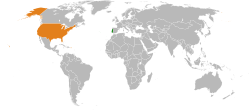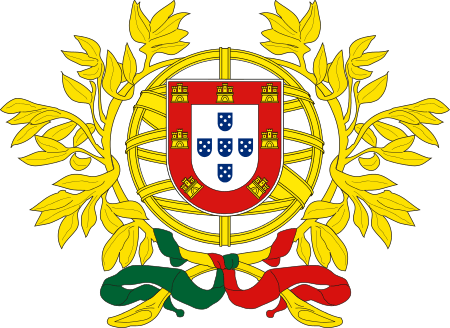Portugal–United States relations
Portugal–United States relations are bilateral relations between Portugal and the United States.
 | |
Portugal |
United States |
|---|---|
According to the 2012 U.S. Global Leadership Report, 36% of Portuguese people approve of U.S. leadership, with 12% disapproving and 52% uncertain.[1]
History
The Kingdom of Portugal never held any colonies in North America due to the 1494 Treaty of Tordesillas, which stipulated that the Portuguese were only allowed to set up colonies in the Old World, leaving the New World open to Spanish colonization. Despite the lack of colonies, a small amount of Portuguese individuals did settle in North America prior to the 19th century.[2]
Unlike other European colonial powers such as France and Spain, Portugal did not intervene on behalf of the United States during the American Revolutionary War. This was because of the aforementioned lack of Portuguese colonies in North America and also because of the historic alliance between Portugal and Britain, dating back to the 14th century. Portugal remained neutral throughout the conflict, eventually joining the First League of Armed Neutrality, a league of European states organized by Catherine the Great of Russia to protect neutral shipping, which was often interrupted and seized by the Royal Navy during the war. While the Portuguese military did not participate in the war, some of the aforementioned Portguese settlers in the Thirteen Colonies did fight, such as the “Virginia Giant” Peter Francisco, a soldier of the Continental Army who was born in the Azores.
In 1791, Portugal became the first neutral nation to establish diplomatic ties with the United States, leading to the arrival of an American legation headed by David Humphreys in Lisbon.[3] Consular relations with the Portuguese island territories of Madeira and the Azores were established in 1790 and 1795 respectively.[4] When the Portuguese court fled to Brazil during the Napoleonic Wars, the American legation followed the court to Rio de Janeiro in 1810 and returned with it to Lisbon in 1822.[5]
The U.S. and Portugal fought together in the First Barbary War (1801-1805) against the Barbary corsairs in an effort to reduce piracy and disruption of trade on the Mediterranean Sea.[6]
Increased Portuguese immigration to the United States began in the early nineteenth century. Approximately 70 percent of these immigrants came from the Azores, with the remainder mostly coming from Madeira and Cape Verde,[7] with very few of them coming from the Portuguese mainland. Most of these Portuguese immigrants settled in New England and ended up working in the whaling industry.[8] The involvement of Portuguese immigrants in the whaling trade also led Portuguese American communities to spring up in the San Francisco Bay Area in California and in Hawaii.[9] Some Portuguese immigrants settled in cities further inland, such as Springfield, Illinois.[10] Today, there are over one million Americans of Portuguese descent. While prolific in some areas, Portuguese immigration was comparatively tiny when compared with the large number of German and Irish immigrants that came to the United States.
The Portuguese government favored the Union during the American Civil War, providing assistance to the Union Navy during the conflict.[11] Due to settling primarily in New England, most Portuguese Americans were Union soldiers.[12]
In 1911, the United States declared its support of the 5 October 1910 revolution that abolished the Portuguese Monarchy and replaced it with the First Portuguese Republic.[13]
In 1917, both Portugal and the United States joined World War I on the side of the Allies. During World War II, Portugal remained neutral until 1944, when it allowed the United States to establish a military base in the Azores. Both countries remained on the same side during the Cold War, with both Portugal and the United States becoming founding members of the North Atlantic Treaty Organization (NATO) in 1949.
The harmonious relationship between Portugal and the United States was strained during the 1960s and 70s. Amid a wider global trend of decolonization, the Portuguese colonies of Angola, Mozambique, and Guinea-Bissau, all in Africa, began to demand independence from Portugal. The strain in relations was caused by the United States declaring their support for these independence movements, a move which greatly angered the Portuguese government.[14] Following the Portuguese Colonial War, Angola, Mozambique, and Guinea-Bissau all gained independence. Portugal’s loss in the war led directly to the Carnation Revolution. The revolution brought down the dictatorial Estado Novo regime that had ruled over Portugal since 1933, beginning the country’s peaceful transition towards democracy and allowing Portuguese-U.S. relations to be repaired.
Since the Carnation Revolution and the end of the Cold War, Portugal and the United States have remained close allies, fighting together in the NATO intervention in Bosnia and Herzegovina, the NATO intervention in Kosovo, the Iraq War, and the War in Afghanistan.
Overview
The defense relationship between the United States and Portugal is centered on the 1995 Agreement on Cooperation and Defense (ACD). For 50 years, Lajes Field in the Azores has played an important role in supporting U.S. military aircraft (its importance such that the US had a contingency plan in 1975 to stimulate Azores independence in the event of a Communist takeover of Portugal[15]). Most recent missions are engaged in counter-terrorism and humanitarian efforts, including operations in Afghanistan and Iraq. Portugal also provides the United States access to Montijo Air Base and a number of ports.
Portugal defines itself as "Atlanticist" emphasizing its support for strong European ties with the United States, particularly on defense and security issues. The Government of Portugal has been a key ally in US, supporting efforts in Iraq, and hosting the Azores Summit that preceded military action.
The United States exported $1.47 billion worth of goods in 2006 and imported an estimated $3.04 billion. While total Portuguese trade has increased dramatically over the last 10 years, the U.S. percentage of Portugal's exports and imports has declined. The Government of Portugal is encouraging greater bilateral investment. US firms play some significant roles in the pharmaceutical, computer, and retail sectors in Portugal, particularly in Lisbon, but their involvement in the automotive sector has sharply declined in recent years.
Principal U.S. Officials include:
- Chargé d’Affaires–Herro Mustafa[16]
- Deputy Chief of Mission—John Olson
- Consul General—Oliver Kinder
- Political/Economic Affairs—Gregory Macris
- Management Affairs—Dwayne Cline
- Public Affairs—Mark Pannell
- Regional Security Officer—Tanya Sears
- Commercial Affairs—Lora Baker
- Defense Attaché—COL Glenn Lemasters
- Office of Defense Cooperation—CDR Oscar Monterrosa
- Consul, Ponta Delgada—Elizabeth Konick
The U.S. maintains an embassy in Lisbon.
See also
References
- U.S. Global Leadership Project Report - 2012 Gallup
- "Portuguese Settlement in the United States". Library of Congress. Retrieved June 17, 2020.
- "A Guide to the United States' History of Recognition, Diplomatic, and Consular Relations, by country, since 1776: Portugal". Office of the Historian. Retrieved June 17, 2020.
- "A Guide to the United States' History of Recognition, Diplomatic, and Consular Relations, by country, since 1776: Portugal". Office of the Historian. Retrieved June 17, 2020.
- "A Guide to the United States' History of Recognition, Diplomatic, and Consular Relations, by country, since 1776: Portugal". Office of the Historian. Retrieved June 17, 2020.
- "The Barbary Wars 1801-1805 and 1815". Veterans Museum at Balboa Park. Retrieved June 17, 2020.
- "Portuguese Settlement in the United States". Library of Congress. Retrieved June 17, 2020.
- "Portuguese Settlement in the United States". Library of Congress. Retrieved June 17, 2020.
- "Portuguese Settlement in the United States". Library of Congress. Retrieved June 17, 2020.
- "Protestant Exiles from Madeira in Illinois". Library of Congress. Retrieved June 17, 2020.
- "Portugal and the U.S. Civil War". Portuguese Historical Museum. Retrieved June 17, 2020.
- "Portugal and the U.S. Civil War". Portuguese Historical Museum. Retrieved June 17, 2020.
- "EUA reconhecem a República". Fundação Mário Soares. Retrieved 23 September 2010.
- "Portugal-US Relations". Global Security.org. Retrieved June 17, 2020.
- Agence France Presse, Raw Story, 19 November 2010, US had plans to ‘take over’ Azores in 1975
- "Chargé d'Affaires Herro Mustafa | U.S. Embassy & Consulate in Portugal". U.S. Embassy & Consulate in Portugal. Retrieved 2017-07-17.
![]()
External links
![]()
